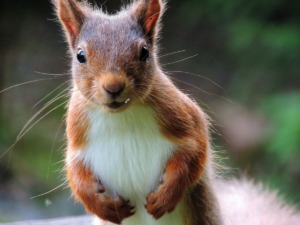Animal Rights: British Mammals’ Fight for Survival

Featured image: Red Squirrel by Malcolm Welch
Almost one in five of British mammal species face a high risk of extinction, according to the first comprehensive review of their populations for more than 20 years launched today by The Mammal Society and Natural England.
The red squirrel, wildcat and the grey long-eared bat are all listed as facing severe threats to their survival.
The review – commissioned by Natural England working in partnership with Scottish Natural Heritage and Natural Resources Wales – also found other mammals such as the hedgehog and water vole have seen their populations decline by up to 66% over the past 20 years.
Climate change, loss of habitat, use of pesticides and road deaths are all putting pressure on some of the best loved and most recognisable of Britain’s 58 terrestrial mammals, whose current status, historical and recent population trends, threats, and future prospects have all been assessed in the review. The work will prioritise conservation actions and also sets an agenda for future research efforts.
Image on the right: Wildcat by Rachel Profit

Prof Fiona Mathews, Mammal Society Chair and professor of Environmental Biology at the University of Sussex, said:
“This is happening on our own doorstep so it falls upon all of us to try and do what we can to ensure that our threatened species do not go the way of the lynx, wolf and elk and disappear from our shores forever.”
The Mammal Society is now calling for more research to be carried out urgently to get a clearer and more accurate picture of Britain’s mammal populations. For many species, including common animals such as rabbits and moles, very little information is available.
Last month, the Society launched a Mammal Mapper app so that any nature lover could record sightings of local mammals using just their smartphone.
Prof Mathews, lead author of the Review of the Population and Conservation Status of British Mammals, said:
“The report highlights an urgent requirement for more research to assess population densities in key habitats because at present, uncertainty levels are unacceptably high. It is possible that declines in many species are being overlooked because a lack of robust evidence precludes assessment. There is also an urgent need to quantify precisely the scale of declines in species such as the hedgehog, rabbit, water vole and grey long-eared bat. Effective and evidence-based strategies for mammal conservation and management must be developed before it is too late.”
The report does highlight that some British mammal populations are in more robust health. Five species have increased in numbers in 20 years, and 18 species have increased their geographical range. The otter, polecat, beaver, wild boar are all now found in more locations than they were 20 years ago although it is also notable that many of the ‘success stories’ are species recently introduced to Great Britain, such as the grey squirrel and muntjac deer.
Image below: Grey Long Eared Bat by Daniel Hargreaves

Surprisingly given their importance to both humans and wildlife, there is very little information on species such as brown rats and house mice: their population estimates are around 7 million, and 5 million respectively, but could in reality be much higher or lower.
Natural England Senior Specialist for Mammals, Katherine Walsh, who coordinated the project, said:
“This project has significantly improved our understanding of the current status of terrestrial mammals known to breed in Great Britain, which is essential to underpin our efforts to protect them and their habitats. Natural England has been leading the way in efforts to recover these vulnerable species, notably through the ‘Back from the Brink’ project which aims to support the recovery of mammals and other species through habitat improvements across England.”
Natural England have been leading the way in efforts to protect these vulnerable species, they have been working in partnership with a number of expert conservation organisations on the Back from the Brink project which aims to bring more than 20 species back from the brink of extinction. This project will benefit hundreds of species, improving habitats and helping to secure the natural recovery of mammals in Great Britain.
Liz Halliwell, Mammal Ecologist for Natural Resources Wales said:
“The project has given us a better understanding of the status of many of the mammals in Wales. It has underlined the importance of having good data for all our mammal species, including some of our most common and widespread. Given the varying patterns of distribution across Britain, understanding area population trends is important.”

